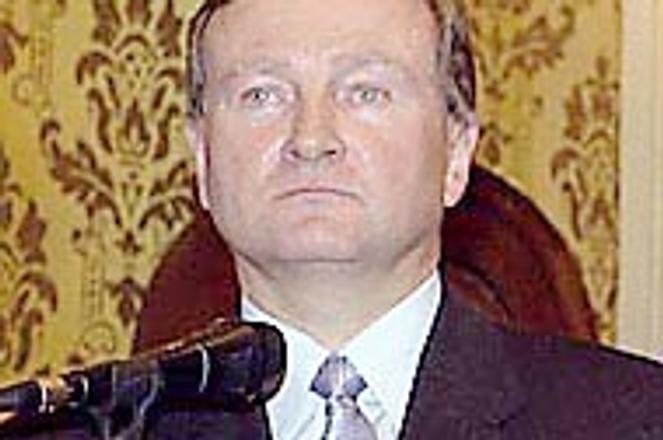"In the present economic climate it's very possible that if prices rise further the internet will become something for the so-called 'upper 10,000' and the ordinary citizen just won't be able to afford it."
API board member Marian Ďurkovič
Prime Minister Mikuláš Dzurinda appealed to Slovak Telecom chief Ladislav Mikuš (left) in a meeting on January 16 not to increase the firm's prices for internet use.photo: TASR
FIXED-LINE telecom monopoly Slovenské telekomunikácie (ST) is being urged not to raise prices for internet connections.
A personal plea from Prime Minister Mikuláš Dzurinda in a meeting with ST President Ladislav Mikuš on January 16 has been followed up by statements from opposition parties objecting strongly to planned price increases.
While the opposition Real Slovak National Party (PSNS) has declared the rises anti-integrationist, a January 18 statement from the largest opposition party, the Movement for a Democratic Slovakia (HZDS), demanded ST work with the government on the prices.
The party said that the two must consider "with utmost seriousness addressing the question of widening the use of internet services" and criticised the probable price hikes.
Managers at ST, in which German telecom colossus Deutsche Telecom holds a 51 per cent stake, are set to meet January 31 to decide on a new internet strategy, including a range of prices for internet connection.
The company had announced at the start of this year that it would be raising the prices of internet connections in 2002, probably in July.
Internet providers claim that the planned rises would see one hour of internet use jump by as much as 50 per cent on a hard line connection and 150 per cent on an ISDN line in certain cases.
If implemented, the hikes would come one year after a tariff rise left the country the most expensive for internet use among the Organisation for Economic Development and Co-operation (OECD), according to the OECD's own research.
The Association of Internet Providers (API) claims more hikes would be disastrous for the growth of the internet in Slovakia.
"In the present economic climate it's very possible that if prices rise further the internet will become something for the so-called 'upper 10,000' and the ordinary citizen just won't be able to afford it," said Marian Ďurkovič, a board member with the API.
Internet use in Slovakia is floundering, according to the API. The expense of connections has stunted the growth of the world wide web in the country, and Slovakia languishes behind neighbours Poland, Hungary and the Czech Republic in the percentage of the population using the internet.
The API claims that only 7.2 per cent of Slovak households have internet connections, and that based on that figure, between 2 and 3 per cent of the population has a home connection to the internet. The association claims that the figure in EU states ranges between 12 and 36 per cent.
Along with the association, other telecoms firms and companies operating in the internet industry have attacked ST in the past over its pricing for internet connections.
They have claimed the company's approach to internet pricing and services has held back the development of the internet, and subsequently business, in Slovakia.
ST has previously been fined for abusing its monopoly position to make internet access more expensive.
In October 2000 the Anti-Monopoly Office (PMÚ) fined ST Sk10 million ($200,000) after it installed "frequency filters" on some fixed lines, including one used by the Slovak Agriculture University in Nitra. The frequency filters limited data transfers, costing users up to five times as much as original internet connection rates on the same lines.
ST today says it supports the spread of internet access in schools and universities.
While the API remains concerned that the price rises will harm internet growth, some others in the industry believe the effect may not be as drastic as the API is predicting.
"In general there won't be much of a negative effect. People who are using the internet will not stop using it but will just do so more effectively," said Ivan Debnár, manager at Slovakia's largest web portal, Zoznam.
Slovenské telekomunikácie did not respond to questions from The Slovak Spectator on its internet strategy.

